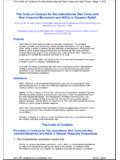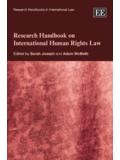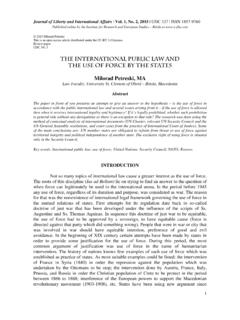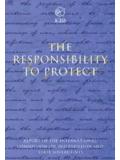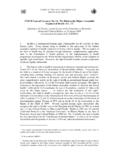Transcription of Act to Introduce the Code of Crimes against …
1 Act to Introduce the code of Crimes against international Law*of 26 June 2002 The Federal Parliament has passed the following Act:Article 1 code of Crimes against international Law (CCAIL)Part 1 General provisionsSection 1 Scope of applicationThis Act shall apply to all criminal offences against international law designated underthis Act, to serious criminal offences1 designated therein even when the offence wascommitted abroad and bears no relation to 2 Application of the general lawThe general criminal law shall apply to offences pursuant to this Act so far as this Actdoes not make special provision in sections 1 and 3 to 5. * Translation Brian In German law the term serious criminal offence ( Verbrechen ) is used to denote criminaloffences ( Straftaten ) that are punishable with not less than one year of imprisonment. Mitigat-ing (and aggravating) circumstances - as regulated for instance in section 8 subsection (5) - areto be disregarded in this respect (section 12 German Criminal code ).
2 As a result, all criminaloffences in the present Draft code are serious criminal offences ( Verbrechen ) with the soleexception of the criminal offences in sections 13 and 14 (see the Explanations: B. Article 1,section 1). Please note that the terminological differentiation between criminal offences Section 3 Acting upon ordersWhoever commits an offence pursuant to Sections 8 to 14 in execution of a militaryorder or of an order comparable in its actual binding effect shall have acted withoutguilt so far as the perpetrator does not realise that the order is unlawful and so far as itis also not manifestly 4 Responsibility of military commanders and other superiors(1) A military commander or civilian superior who omits to prevent his or her subordi-nate from committing an offence pursuant to this Act shall be punished in the sameway as a perpetrator of the offence committed by that subordinate. Section 13 subsec-tion (2) of the Criminal code shall not apply in this case.
3 (2) Any person effectively giving orders or exercising command and control in a unitshall be deemed equivalent to a military commander. Any person effectively exercisingcommand and control in a civil organisation or in an enterprise shall be deemedequivalent to a civilian 5 Non-applicability of statute of limitationsThe prosecution of serious criminal offences2 pursuant to this Act and the execution ofsentences imposed on their account shall not be subject to any statute of limitations. ( Straftaten ) and serious criminal offences ( Verbrechen ) is, for technical reasons, not re-flected everywhere in this Cf. footnote to section 2 Crimes against international LawChapter 1 Genocide and Crimes against humanitySection 6 Genocide(1) Whoever with the intent of destroying as such, in whole or in part, a national, ra-cial, religious or ethnic group1.
4 Kills a member of the group,2. causes serious bodily or mental harm to a member of the group, especially of thekind referred to in section 226 of the Criminal code ,3. inflicts on the group conditions of life calculated to bring about their physical de-struction in whole or in part,4. imposes measures intended to prevent births within the group,5. forcibly transfers a child of the group to another groupshall be punished with imprisonment for life.(2) In less serious cases referred to under subsection (1), numbers 2 to 5, the pun-ishment shall be imprisonment for not less than five 7 Crimes against humanity(1) Whoever, as part of a widespread or systematic attack directed against any civil-ian population,1. kills a person,2. inflicts, with the intent of destroying a population in whole or in part, conditions oflife on that population or on parts thereof, being conditions calculated to bringabout its physical destruction in whole or in part,3.
5 Traffics in persons, particularly in women or children, or whoever enslaves a personin another way and in doing so arrogates to himself a right of ownership over thatperson,4. deports or forcibly transfers, by expulsion or other coercive acts, a person lawfullypresent in an area to another State or another area in contravention of a generalrule of international law,5. tortures a person in his or her custody or otherwise under his or her control bycausing that person substantial physical or mental harm or suffering where suchharm or suffering does not arise only from sanctions that are compatible with inter-national law,6. sexually coerces, rapes, forces into prostitution or deprives a person of his or herreproductive capacity, or confines a woman forcibly made pregnant with the intentof affecting the ethnic composition of any population,7. causes a person s enforced disappearance, with the intention of removing him orher from the protection of the law for a prolonged period of time,(a) by abducting that person on behalf of or with the approval of a State or a po-litical organisation, or by otherwise severely depriving such person of his orher physical liberty, followed by a failure immediately to give truthful informa-tion, upon inquiry, on that person s fate and whereabouts, or(b) by refusing, on behalf of a State or of a political organisation or in contraven-tion of a legal duty, to give information immediately on the fate and where-abouts of the person deprived of his or her physical liberty under the circum-stances referred to under letter (a) above, or by giving false informationthereon,8.
6 Causes another person severe physical or mental harm, especially of the kind re-ferred to in section 226 of the Criminal code ,9. severely deprives, in contravention of a general rule of international law, a personof his or her physical liberty, or10. persecutes an identifiable group or collectivity by depriving such group or collectiv-ity of fundamental human rights, or by substantially restricting the same, on politi-cal, racial, national, ethnic, cultural or religious, gender or other grounds that arerecognised as impermissible under the general rules of international lawshall be punished, in the cases referred to under numbers 1 and 2, with imprisonmentfor life, in the cases referred to under numbers 3 to 7, with imprisonment for not lessthan five years, and, in the cases referred to under numbers 8 to 10, with imprisonmentfor not less than three years.(2) In less serious cases under subsection (1), number 2, the punishment shall beimprisonment for not less than five years, in less serious cases under subsection (1),numbers 3 to 7, imprisonment for not less than two years, and in less serious casesunder subsection (1), numbers 8 and 9, imprisonment for not less than one year.
7 (3) Where the perpetrator causes the death of a person through an offence pursuantto subsection (1), numbers 3 to 10, the punishment shall be imprisonment for life or fornot less than ten years in cases under subsection (1), numbers 3 to 7, and imprison-ment for not less than five years in cases under subsection (1), numbers 8 to 10.(4) In less serious cases under subsection (3) the punishment for an offence pursuantto subsection (1), numbers 3 to 7, shall be imprisonment for not less than five years,and for an offence pursuant to subsection (1), numbers 8 to 10, imprisonment for notless than three years.(5) Whoever commits a crime pursuant to subsection (1) with the intention of main-taining an institutionalised regime of systematic oppression and domination by oneracial group over any other shall be punished with imprisonment for not less than fiveyears so far as the offence is not punishable more severely pursuant to subsection (1)or subsection (3).
8 In less serious cases the punishment shall be imprisonment for notless than three years so far as the offence is not punishable more severely pursuant tosubsection (2) or subsection (4).Chapter 2 War crimesSection 8 War Crimes against persons(1) Whoever in connection with an international armed conflict or with an armed con-flict not of an international character1. kills a person who is to be protected under international humanitarian law,2. takes hostage a person who is to be protected under international humanitarianlaw,3. treats a person who is to be protected under international humanitarian law cruellyor inhumanly by causing him or her substantial physical or mental harm or suffer-ing, especially by torturing or mutilating that person,4. sexually coerces, rapes, forces into prostitution or deprives a person who is to beprotected under international humanitarian law of his or her reproductive capacity,or confines a woman forcibly made pregnant with the intent of affecting the ethniccomposition of any population,5.
9 Conscripts children under the age of fifteen years into the armed forces, or enliststhem in the armed forces or in armed groups, or uses them to participate activelyin hostilities,6. deports or forcibly transfers, by expulsion or other coercive acts, a person who isto be protected under international humanitarian law and lawfully present in anarea to another State or another area in contravention of a general rule of interna-tional law,7. imposes on, or executes a substantial sentence in respect of a person who is to beprotected under international humanitarian law, in particular the death penalty orimprisonment, without that person having been sentenced in a fair and regular trialaffording the legal guarantees required by international law,8. exposes a person who is to be protected under international humanitarian law tothe risk of death or of serious injury to health(a) by carrying out experiments on such a person , being a person who has notpreviously given his or her voluntary and express consent, or where the ex-periments concerned are neither medically necessary nor carried out in his orher interest,(b) by taking body tissue or organs from such a person for transplantation pur-poses so far as it does not constitute removal of blood or skin for therapeuticpurposes in conformity with generally recognised medical principles and theperson concerned has previously not given his or her voluntary and expressconsent, or(c)
10 By using treatment methods that are not medically recognised on such person,without this being necessary from a medical point of view and without the per-son concerned having previously given his or her voluntary and express con-sent, or9. treats a person who is to be protected under international humanitarian law in agravely humiliating or degrading mannershall be punished, in the cases referred to under number 1, with imprisonment for life,in the cases referred to under number 2, with imprisonment for not less than five years,in the cases referred to under numbers 3 to 5, with imprisonment for not less than threeyears, in the cases referred to under numbers 6 to 8, with imprisonment for not lessthan two years, and, in the cases referred to under number 9, with imprisonment for notless than one year.(2) Whoever in connection with an international armed conflict or with an armed con-flict not of an international character, wounds a member of the adverse armed forces ora combatant of the adverse party after the latter has surrendered unconditionally or isotherwise placed hors de combat shall be punished with imprisonment for not less thanthree years.



